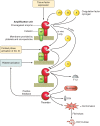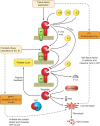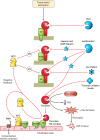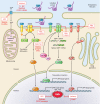Sepsis: multiple abnormalities, heterogeneous responses, and evolving understanding
- PMID: 23899564
- PMCID: PMC3962548
- DOI: 10.1152/physrev.00037.2012
Sepsis: multiple abnormalities, heterogeneous responses, and evolving understanding
Abstract
Sepsis represents the host's systemic inflammatory response to a severe infection. It causes substantial human morbidity resulting in hundreds of thousands of deaths each year. Despite decades of intense research, the basic mechanisms still remain elusive. In either experimental animal models of sepsis or human patients, there are substantial physiological changes, many of which may result in subsequent organ injury. Variations in age, gender, and medical comorbidities including diabetes and renal failure create additional complexity that influence the outcomes in septic patients. Specific system-based alterations, such as the coagulopathy observed in sepsis, offer both potential insight and possible therapeutic targets. Intracellular stress induces changes in the endoplasmic reticulum yielding misfolded proteins that contribute to the underlying pathophysiological changes. With these multiple changes it is difficult to precisely classify an individual's response in sepsis as proinflammatory or immunosuppressed. This heterogeneity also may explain why most therapeutic interventions have not improved survival. Given the complexity of sepsis, biomarkers and mathematical models offer potential guidance once they have been carefully validated. This review discusses each of these important factors to provide a framework for understanding the complex and current challenges of managing the septic patient. Clinical trial failures and the therapeutic interventions that have proven successful are also discussed.
Figures










References
-
- American College of Chest Physicians/Society of Crit Care Med. College of Chest Physicians/Society of Crit Care Med Consensus Conference: definitions for sepsis and organ failure and guidelines for the use of innovative therapies in sepsis. Critical Care Med 20: 864–874, 1992 - PubMed
-
- A Veterans Administration Systemic Sepsis Cooperative Study Group. Effect of high-dose glucocorticoid therapy on mortality in patients with clinical signs of systemic sepsis. N Engl J Med 317: 659–665, 1987 - PubMed
-
- Abraham E, Glauser MP, Butler T, Garbino J, Gelmont D, Laterre PF, Kudsk K, Bruining HA, Otto C, Tobin E, Zwingelstein C, Lesslauer W, Leighton A. p55 tumor necrosis factor receptor fusion protein in the treatment of patients with severe sepsis and septic shock. A randomized controlled multicenter trial Ro 45-2081 Study Group. JAMA 277: 1531–1538, 1997 - PubMed
-
- Abraham E, Laterre PF, Garg R, Levy H, Talwar D, Trzaskoma BL, Francois B, Guy JS, Bruckmann M, Rea-Neto A, Rossaint R, Perrotin D, Sablotzki A, Arkins N, Utterback BG, Macias WL, and the Administration of Drotrecogin Alfa in Early Stage Severe Sepsis Study Group Drotrecogin Alfa (activated) for adults with severe sepsis and a low risk of death. N Engl J Med 353: 1332–1341, 2005 - PubMed
-
- Abraham E, Wunderink R, Silverman H, Perl TM, Nasraway S, Levy H, Bone R, Wenzel RP, Balk R, Allred R. Efficacy and safety of monoclonal antibody to human tumor necrosis factor alpha in patients with sepsis syndrome A randomized, controlled, double-blind, multicenter clinical trial TNF-α MAb Sepsis Study Group. JAMA 273: 934–941, 1995 - PubMed
Publication types
MeSH terms
Grants and funding
LinkOut - more resources
Full Text Sources
Other Literature Sources
Medical

